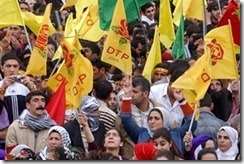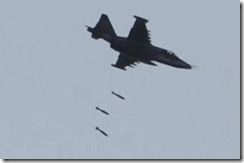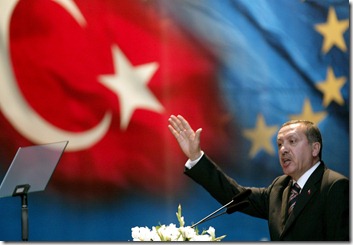Somewhat ironically, as recently as this year there was hope in certain quarters that Turkish Prime Minister Recep Tayyip Erdoğan represented a progressive force, potentially willing to end decades of state oppression against Turkey’s Kurdish minority. His ‘Kurdish Opening’, ‘Kurdish Initiative’ (or any of the other names it went by) certainly involved some strong rhetoric; Erdoğan became the first Turkish leader to even recognise the Kurds’ existence, rather than using the previous categorisation of “mountain Turks”, and he pledged to address their grievances through granting freedoms, rather than supressing them using force. A spattering of Kurdish MPs in his Justice and Development Party (AKP) and a few token gestures including the opening of a state-funded Kurdish language channel seemed to indicate moves in the right direction. Investment and direct flights to the autonomous Kurdish region of Iraq raised expectations further still.
But nothing really changed and despite his words Erdoğan’s government took drastic actions that set back any hope of resolution.
In 2009 the leading Kurdish party, the Democratic Society Party (DTP), became the latest political grouping to be shut down over alleged links to the Kurdistan Worker’s Party (PKK)- a rebel force that has waged over two decades of armed struggle in pursuit of Kurdish independence. Despite protests from the EU, the DTP’s assets were taken by the state and scores of its members were kicked out of parliament then banned from politics.
latest political grouping to be shut down over alleged links to the Kurdistan Worker’s Party (PKK)- a rebel force that has waged over two decades of armed struggle in pursuit of Kurdish independence. Despite protests from the EU, the DTP’s assets were taken by the state and scores of its members were kicked out of parliament then banned from politics.
Having thus provoked the Kurdish population, Erdoğan underscored his unwillingness to move away from the old cycle attacks and retaliation between the PKK and the Turkish military that has so far claimed some forty-thousand lives. After eleven Turkish soldiers were killed in 2010, he cast aside all talk of negotiations, vowed to “annihilate” the PKK and launched air strikes against suspected strongholds on both Turkish and Iraqi soil.
Things deteriorated further when elected members the DTP’s successor, the Peace and Democracy Party (BDP), were imprisoned for questionable links to the PKK. Erdoğan subsequently hammered home his disdain of Kurdish advocates by cutting off all contact with the BDP and declaring that he had “solved” the entire issue. As tensions rose over the constant setbacks and a lack of progress towards any realisation of their rights, Kurds threatened a campaign of civil disobedience; Erdoğan, with clearly no intention of calming matters, stoked the fire by an ill-timed statement that he would have executed imprisoned PKK leader Abdullah Ocalan if he’d had the chance.
Recent statistics from a Kurdish human rights group now point to a steady increase in human rights abuses by the Turkish authorities, including thousands of detentions, (hundreds of them involving under-eighteens) mainly on charges of PKK support, but in reality stemming from calls for independence and criticism of Erdoğan’s government.
 Against such a backdrop it is hardly surprising than an escalation in violence by the PKK over recent weeks has been met with brutal and ultimately counterproductive strikes by Turkish forces. In retaliation for the killing of nine soldiers, Turkey launched airstrikes over the Kurdish region of Iraq killing one hundred suspected PKK militants and, human rights groups report, numerous civilians. Tragically for those caught up in the midst of the conflict, Turkey’s bombings followed a bout of Iranian shelling – the combination of which has forced many Kurds to flee to refugee camps, abandoning their crops and homes. In the short term this creates humanitarian issues; in the long run it is likely to drive even more people into the arms of the PKK.
Against such a backdrop it is hardly surprising than an escalation in violence by the PKK over recent weeks has been met with brutal and ultimately counterproductive strikes by Turkish forces. In retaliation for the killing of nine soldiers, Turkey launched airstrikes over the Kurdish region of Iraq killing one hundred suspected PKK militants and, human rights groups report, numerous civilians. Tragically for those caught up in the midst of the conflict, Turkey’s bombings followed a bout of Iranian shelling – the combination of which has forced many Kurds to flee to refugee camps, abandoning their crops and homes. In the short term this creates humanitarian issues; in the long run it is likely to drive even more people into the arms of the PKK.
There will be more bloodshed to come. Yet owing to the importance of securing Turkish support against Bashar al-Assad’s murderous crackdown in neighbouring Syria, international criticism is unlikely. Indeed, Erdoğan has already exploited the complex politics of the revolutions in Syria and Libya to deflect attention away from his own abusive rule.
When uprisings first began to spread throughout the Arab world, there was speculation that the Kurds across the Middle East could follow suite. That could still happen, but with their largest party in Turkey marginalised, their autonomous region in Iraq facing continued bombing and suppression being stepped up across the region, hopes of freedom currently seem bleak. Erdoğan could yet be a valuable ally for those seeking to reign in al-Assad and keep the Arab Spring alive…but he is at the forefront of killing the Kurdish Spring before it even truly has a chance to begin.




No comments:
Post a Comment